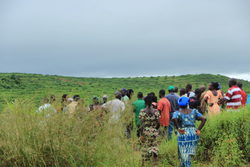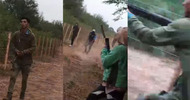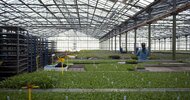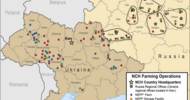
Community members look out at land cleared by Malaysian palm oil investor Sime Darby in 2012, Liberia. (Photo: Ashoka Mukpo/Mongabay)
‘We come from the earth’: Q&A with Goldman Prize winner Alfred Brownell
by Ashoka Mukpo
Following the end of its civil war in the summer of 2003, Liberia became a test case for how foreign investment in extracting natural resources could quickly improve people’s lives. Urged on by international donors, the government, then led by Ellen Johnson Sirleaf, turned to Liberia’s forests and hills for solutions. Natural resources had helped to start the war, and now they would help move the country away from it.
In just a few years, the government signed contracts worth tens of billions of dollars with mining, palm oil, petroleum, and logging companies from across the world. At one point, as much as half of Liberia’s land mass was under contract to timber companies alone.
Proponents hailed this flood of foreign investment as transformative. Critics called it catastrophic, a staggering land grab that would dispossess rural communities and destroy the environment while enriching an already wealthy elite.
One of the local voices strongly challenging this turn of events was Alfred Brownell, a hard-nosed and bombastic lawyer with a knack for making headlines. His organization, Green Advocates, had a reputation for being independent and confrontational, spearheading a 2012 complaint to the Roundtable on Sustainable Palm Oil (RSPO) on behalf of a group of communities in two separate regions that halted a campaign of dispossession and intimidation by two of the biggest palm oil investors in Liberia, the Indonesia-linked Golden Veroleum and Malaysia’s Sime Darby.
The work was highly visible and controversial, and in the course of it Brownell made powerful enemies. He was attacked by a mob in a forested area at one point, and not long afterward, Johnson Sirleaf ominously referenced NGOs that were “challenging national sovereignty” in her 2014 State of the Union address.
But now, more than five years later, Brownell and his compatriots are being proven painfully correct in their assessment of what those investors had to offer Liberia. After a series of riots at major oil palm plantations and iron mines, along with a global drop in commodity prices, many of the investors once heralded as the saviors of Liberia have folded up or are actively trying to sell their stakes in the country. The country’s economy is spiraling downward as inflation skyrockets. The jobs and development promised to rural communities by investors who inked deals with the Liberian government in the late 2000s have failed to materialize in the wake of the land disputes and conflicts caused by the tempestuous implementation of those deals.
Brownell’s years working in communities affected by palm oil companies, supporting their demands for the government to recognize their rights to make decisions about their ancestral land, and organizing resistance against what many saw as a new form of colonialism were recognized earlier this year when he shared the 2019 Goldman Prize along with five other environmental and community rights activists from around the world.
Mongabay spoke to Brownell about his work as an environmental advocate in Liberia. The following is an edited version of that interview:
Mongabay: After the war ended, Liberia moved quickly to attract foreign investors in the extractive sector – mining, timber, large-scale agriculture. What did you think when you saw the contracts that the Johnson Sirleaf government was signing?
Alfred Brownell: I was outraged and angry. And I wondered whether those who’d taken over the country had reflected on the past, and how greed and mismanagement of natural wealth had fueled the conflict. If you took a historical perspective on Liberia, you’d realize that the country is a case study on how foreign direct investment, if not properly channeled through a transparent process that respects people’s rights, can produce a country that grows without development. We were hoping that it would be time to rethink the kind of development model Liberia would follow, so we were really outraged.
There were many folks who were only interested in theoretical growth. There were times where if you’d look at the paper, it would say Liberia is growing at a rate of 7 percent or 8 percent [GDP]. But no one was looking at the ground to look at exactly what the implications were because it was a disaster.
It seems that wealthy donors played a big role in convincing the Sirleaf administration to follow this strategy.
It became a problem. I know for example the World Bank had an expert in [Liberia’s Forestry Development Authority] whose only goal was to make sure forest concessions were established, so they pushed that. They’d say, OK, well what is the value of this concession? If the value is $200 million, the World Bank ticks that box. So if you have 10 of those concessions, it’s $2 billion, the World Bank will tick that box and say that forest concessions attracted $2 billion dollars to Liberia, so that is growth. But we knew that didn’t translate to anything tangible for the people.
It was clear that many of the development partners were hurrying to try to make Liberia a success story that had attracted all these investments. So if you brought in all these companies, to the rest of the world it would look like Liberia was doing well, but it was just an illusion. In reality, Liberia was not doing well.
Let’s talk about the oil palm contracts. These were huge tracts of land in forested areas given over to set up oil palm plantations. Do you think the government cared about the environmental damage that would result?
There was nobody in the government who really understood what value the forest has to the communities there. The elites stereotyped communities and indigenous people and saw them as primitive, as savages, as poverty-stricken and living a miserable life. Nobody appreciated that for centuries it was these indigenous people who lived close to the resources, managed the land, preserved the forest, and developed the innovation and business models that had co-existed with the forest.
I’ve gone to communities that have taken me to the deepest part of the forest where you see trees like giants rising into the sky, and the chiefs and elders have been able to explain the history of the forest. They’ve walked me to historical zones and told me how when the people came, this is where they settled. You wouldn’t imagine that men have ever been there but they have.
So that was their history. The government didn’t appreciate that part, and by taking that history and giving it out to an oil palm company, you were wiping that out. The government never appreciated that the forest represented religion for people, and it was sacred.
It doesn’t seem like the government was very conscious of the needs of those communities. They felt the investments would be good for the country so it was OK to push people around a little bit, right?
Not just a little bit. You don’t give out 350,000 hectares (865,000 acres) where people live, their home, their religion, their culture, and the businesses they developed. Think about that. It was like an invasion. It’s not just their homes, it’s their businesses and how they generated income — just wiped out.
And think about what this forest means for the entire region. Where we are now, with only 12 years left to provide an answer to address the warming of the planet? Think about how Liberia would be a global leader in [addressing] climate change if we’d thought about those things. But they just thought, ‘Oh the company is coming in and the value is $2.7 billion’ and people’s heads popped up.
Think about if someone came in and said, ‘OK, we’re going to invest in 500 farmers, instead of driving them out.’ You’ve created 500 small businesses. And businesses that people have done for decades, where they could grow palm and co-exist with nature.
If we’d invested in the innovation and creativity of those farmers who’d created those models for centuries it would have been a different thing altogether.
How do you balance people’s need for a better life with the importance of conserving the natural environment?
It’s about innovation and creativity, rethinking development. If you really want to support people and do business development and entrepreneurship, you have to start by seeing what they’re already doing in those towns and villages. What is it they’re involved with to generate an income? What are they surviving off, and how do you work with them to innovate and develop that process to help it grow? There’s community forestry, entrepreneurship, protected area management … there’s a whole range of ideas.
What I’ve seen investment doing now in Liberia and other parts of the world is like a kind of imperialism, where people go to your country, capture it, and say, ‘We have to teach them how to be civilized because they’re unable to take care of themselves.’
But you know, those villages have their own system of governance with which they manage the resources and engage in land-use planning processes. They’ve done it over and over. So if we really want to try to address the plague of climate change, it’s time to make that investment in innovation and business models created by communities, engaging in extractive processes in forests without destroying them.
There was a lot of blowback toward you for this work, and at one point you were attacked, later having to flee Liberia. How have you coped with that?
Since law school I’ve been angry at what was happening in my country, because I feel so much has come from nature, from the planet. We come from the earth. I’ve had a recognition that this planet has given me so much, and it’s important to protect it, to stand for it and defend it.
So if it gives me life, it’s worth it to give my life back in defense of it.
Thanks, Alfred, and congratulations.
Thank you.












